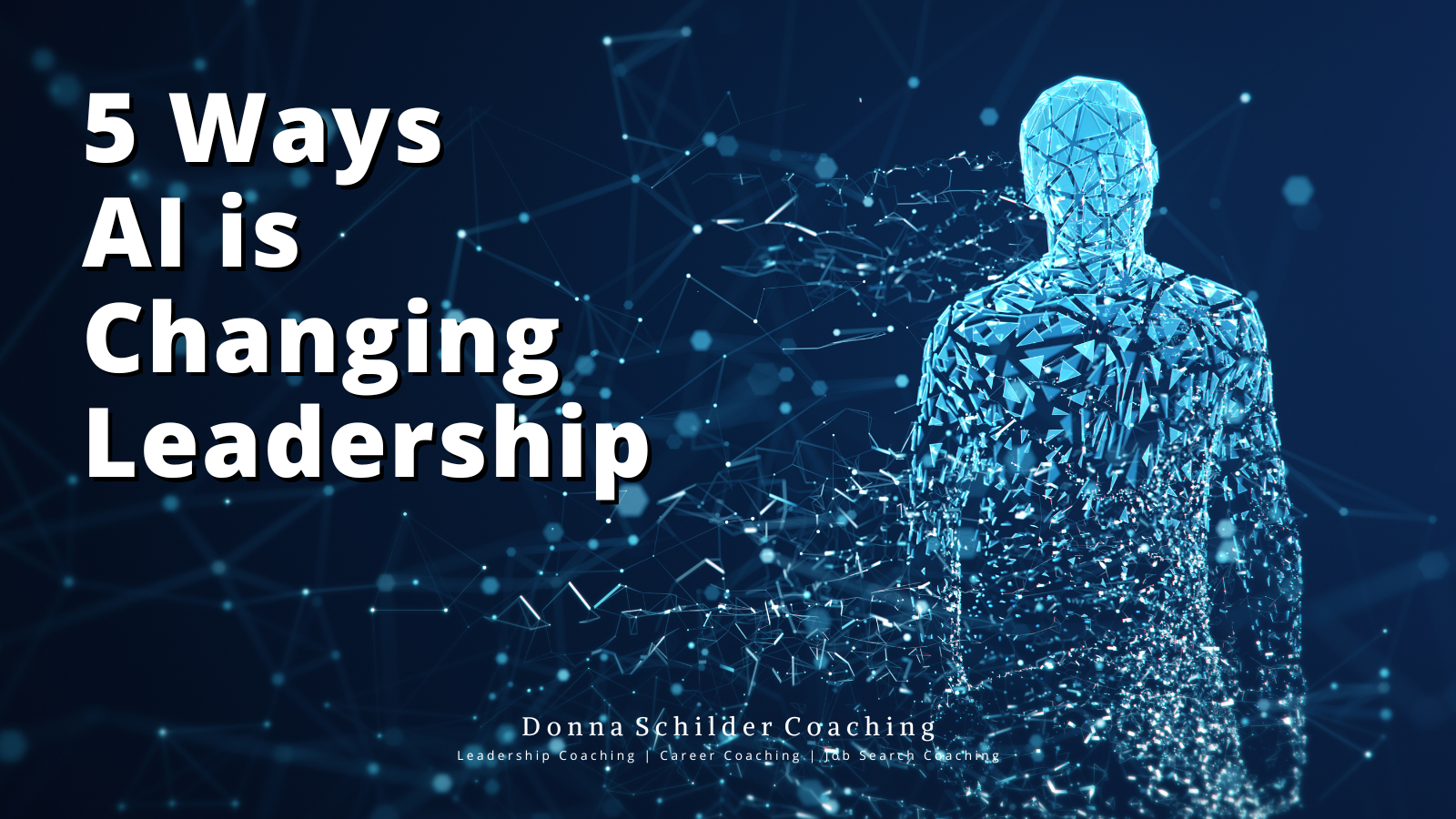If you’ve switched careers, searched for a job, or been in charge of hiring in the last couple of years, you’ve already seen the impact that Artificial Intelligence (AI) is having on talent management.
But have you noticed that AI is impacting the way leaders lead in many ways? As AI technology advances leaders must change the way they lead to adapt to the changes it creates.
Here five ways that AI is changing leadership:
1. Creativity will become even more crucial.
In the face of advancing computer capabilities, leaders must strive to surpass these machines. To stay competitive and drive progress, it’s crucial for them to tap into their creativity.
While computers can process vast amounts of data and perform complex operations at lightning speeds, they lack the human touch. Creative thinking is what sets us apart from machines and allows us to come up with innovative solutions to problems.
By embracing our creativity, we can find new and better ways to approach challenges and push the boundaries of what’s possible. Leaders who prioritize creativity can inspire their teams to think outside the box and achieve greater success.
So, let’s celebrate the unique skills that make us human, and use them to our advantage in a world that’s becoming increasingly technology-driven!
2. Autonomous teams and decentralized structures will become the standard.
In order to do this, leaders must trust their teams and empower them to make decisions on their own. This means giving them the necessary resources and support to achieve their goals, while also holding them accountable for their performance.
Communication is key in this type of structure, as teams must be able to collaborate and share information freely in order to make informed decisions. Additionally, leaders must be willing to listen to feedback from their teams and make necessary adjustments to ensure that everyone is working together towards a common goal.
Ultimately, a decentralized structure and autonomous teams can lead to increased innovation, higher employee satisfaction, and better overall outcomes for the organization.
3. It is crucial to take ethical considerations into account when utilizing AI technology.
It is especially important to handle AI technology with care to prevent unethical practices. Because AI makes it easier to be unethical, maintaining a high level of ethics and honesty is more important than ever. Leaders should prioritize integrating these values into their decision-making processes to ensure they are making the right choices.
One way to maintain ethics and honesty in AI is to ensure that the data used to train the algorithms is diverse and representative of all populations. This can help prevent bias and discrimination in the output of the AI systems. Additionally, transparency is key in ensuring ethical AI practices. Companies should be open about the algorithms they use and how they make decisions. This not only builds trust with customers, but also allows for accountability in the case of mistakes or errors.
Finally, it’s important to continually evaluate and reassess the use of AI to ensure it aligns with ethical principles and values. By doing so, we can harness the power of AI while maintaining integrity and ethical standards.
4. Predictive analytics will become essential in decision making for leaders.
Effective leaders must have a forward-thinking mindset and utilize predictive analytics when making decisions. While studying past trends and benchmarks can be helpful, it is crucial to prioritize future-focused insights. Predictive analytics provides more accurate data to help leaders make informed decisions for their organization’s future.
Incorporating predictive analytics into decision-making processes can also help leaders identify potential risks and opportunities before they occur. By utilizing data analysis tools and techniques, leaders can gain a deeper understanding of their organization’s strengths, weaknesses, and market trends. This information can then be used to create strategic plans that align with future goals and objectives.
In addition, predictive analytics can assist with resource allocation, budget forecasting, and improving overall operational efficiency. Ultimately, effective leaders must be willing to embrace new technologies and approaches to stay ahead of the competition and drive long-term success for their organization.
5. Leaders will need to quickly weigh risks vs. benefits.
In today’s fast-paced environment, taking risks and making bold moves is essential to stay ahead. However, leaders must also take the time to assess the risks and rewards associated with each decision. While taking risks has become a necessity to keep up, making informed decisions is equally important for leaders to succeed.
That’s why it is important for leaders to strike a balance between taking risks and making informed decisions. Blindly taking risks without conducting proper analysis can lead to negative consequences for individuals and organizations. On the other hand, being too cautious and not taking any risks can result in missed opportunities and stagnation.
To make informed decisions, leaders must gather all relevant information and consider the potential outcomes of each option. This includes analyzing the potential benefits, drawbacks, and risks involved. It’s important to involve all stakeholders and seek input from experts in the field to ensure a well-informed decision is made.
How Do You Think AI Is Changing Leadership?
As AI continues to evolve, you will encounter new challenges, and it’s up to you to stay ahead of the curve and adapt to these changes.
How do you think AI is changing leadership?
I posed that question in a LinkedIn post and one of my Glacier Point Solutions coaches, John Lokhorst, CSP, CPA, PCC, commented, “AI can serve as a brainstorming partner in creative thinking, broadening the leader’s perspective and provoking thoughts in new areas, or those not in the leader’s initial thinking. On the flip side, the emergence of AI makes Emotional Intelligence that much more crucial for leaders, as a differentiator in human interactions.”
This is so true. Broadening your perspective and provoking creativity is a very creative way of using AI. This is so helpful as we all learn how to leverage AI.
And boy, do I agree that people skills will be even more valuable as AI takes over some of our more mundane tasks.
Do you have something to add? Join our discussion on LinkedIn!




 Donna Schilder
Donna Schilder